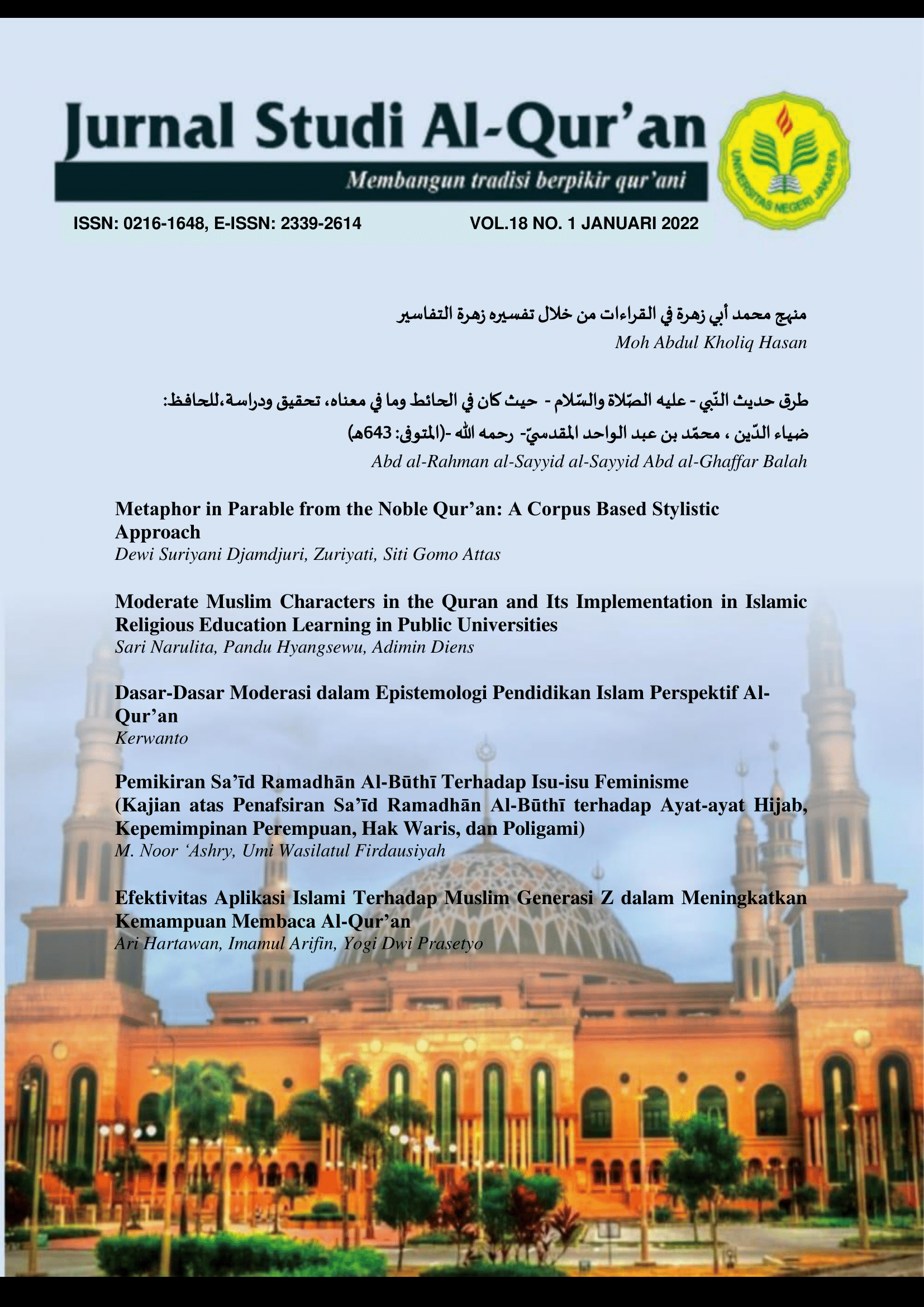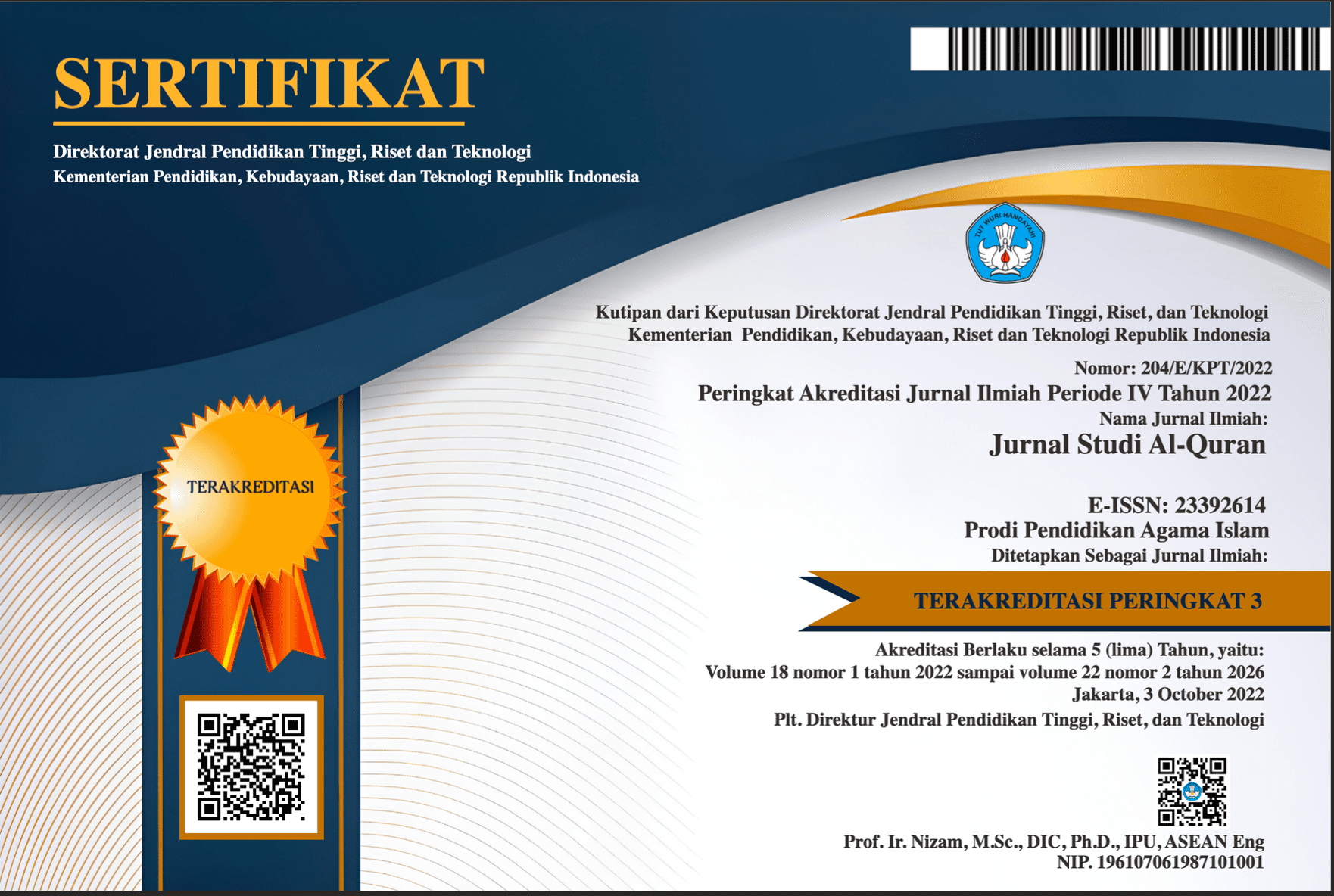Effectiveness of Islamic Applications Against Generation Z Muslims in Improving The Ability to Read the Qur'an
DOI:
https://doi.org/10.21009/JSQ.018.1.07Keywords:
Generation Z, Islamic Apps, Al-Qur'anAbstract
As a generation that lives in the era of technological development, Generation Z sees smartphones no longer as devices but more as a lifestyle. The rapid growth of technology makes the smartphones that they hold offer many innovations that can facilitate all aspects of their lives, including worship by reading the Al-Qur'an through Islamic applications. It is believed that an Islamic application with various features and flexibility can improve the user's Al-Qur'an reading ability, especially the technology-savvy Generation Z. By involving 85 Muslim respondents of generation Z through an online survey, this study seeks to find out how practical Islamic applications are to increase the skills of reading the Al-Qur'an for generation Z Muslims. Various opinions of respondents are presented and then categorized so that these opinions result from a percentage stating that Islamic applications are declared quite effective to improve Gen Z's skills in reading the Al-Qur'an.
References
Effendi, M. R. (2021). Teologi Islam; Potret Sejarah dan Perkembangan Mazhab KAlam. Literasi Nusantara.
Effendi, M. R., Nurparatiwi, S., Narulita, S., Tsaqila, D. F., & Nurhidayat, M. (2021). Penguatan Softskill Guru Dalam Upaya Peningkatan Etos Belajar Peserta Didik Pada Masa PAndemi Covid-19. Sivitas: Jurnal Pengabdian dan Pemberdayaan Masyarakat, 1(2), 41-51.
Ma’ruf, Abdullah. Metodologi Penelitian Kuantitatif. 1st ed. Sleman: Aswaja Pressindo.
Narulita, S., Aulia, R. N., Barnansyah, M. R., Aminah, A., & as Suminar, M. Z. (2019). Pengembangan Kompetensi Guru dalam Pembelajaran PAI bagi Generasi Z. Publikasi Pendidikan, 9(3), 217-221.
Nurpratiwi, S., Effendi, M. R., & Amaliyah, A. (2021). Improving Religious Literacy Through Islamic Religious Education Course Based On The Flipped Classroom. Istawa: Jurnal Pendidikan Islam, 6(1), 16-29.
Nurpratiwi, S., Ridwan Effendi, . M., & M Barnansyah, R. (2021). Self-Reflection of Prospective Teacher Students On Tpack Ability Through Case-Based Learning Model. Muttaqien Publishing, 1(1), 21–29.
Halim, A., Anggraeni, D., & Fadhil, A. (2021). Pembelajaran Al-Quran Berbasis Edutainment. Jurnal Studi Al-Qur’an , 17(1), 75 - 92.
Hidayat, A. A., Effendi, M. R., & Hakam, A. (2021). Religion and Tradition: Overview of Culture and Islamic Acculturation in The Ciptagelar Society. Muttaqien Publishing, 1(1), 223–232.
Rastati, Ranny. “MEDIA LITERASI BAGI DIGITAL NATIVES: PERSPEKTIF GENERASI Z DI JAKARTA.” Jurnal Kwangsan 6, no. 1 (June 29, 2018): 60.
Sarwono, Jonathan. Metode Penelitian Kuantitatif Dan Kualitatif. 1st ed. Yogyakarta: Graha Ilmu, 2006.
Siti Julaeha, E., Ridwan Effendi, M., & Karnafi. (2021). Everyone is Teacher Here Method and Its Effectiveness On Learning Outcomes of Akidah Akhlak. Muttaqien Publishing, 1(1), 91–104.
Yasir, Muhammad, and Ade Jamaruddin. Studi Al-Qur’an. Edited by Jani Arni. Pekanbaru: Asa Riau (CV. Asa Riau), 2016.
“Al Quran Indonesia - Aplikasi Di Google Play.” Accessed November 27, 2021. https://play.google.com/store/apps/details?id=com.andi.alquran.id&hl=in&gl=US.
“KEPEMIMPINAN MASA KINI - Google Books.” Accessed November 27, 2021. https://www.google.co.id/books/edition/KEPEMIMPINAN_MASA_KINI/rosaEAAAQBAJ?hl=id&gbpv=1&printsec=frontcover.
“Metode Penelitian Survei Online Dengan Google Forms - Google Books.” Accessed November 27, 2021. https://www.google.co.id/books/edition/Metode_Penelitian_Survei_Online_dengan_G/u7ChDwAAQBAJ?hl=id&gbpv=1&printsec=frontcover.
“Muslim Pro: Kini Orang Lebih Suka Baca Alquran Dari Aplikasi.” Accessed November 27, 2021. https://www.cnnindonesia.com/teknologi/20210413150400-185-629333/muslim-pro-kini-orang-lebih-suka-baca-alquran-dari-aplikasi.
“Muslim Pro Adzan Sholat Kiblat - Aplikasi Di Google Play.” Accessed November 27, 2021. https://play.google.com/store/apps/details?id=com.bitsmedia.android.muslimpro&hl=in&gl=US.
Downloads
Published
How to Cite
Issue
Section
License
Authors who publish with this Journal agree to the following terms:
- Author retain copyright and grant the journal right of first publication with the work simultaneously licensed under a creative commons attribution licensethat allow others to share the work within an acknowledgement of the work’s authorship and initial publication of this journal.
- Authors are able to enter into separate, additional contractual arrangementfor the non-exclusive distribution of the journal’s published version of the work (e.g. acknowledgement of its initial publication in this journal).
- Authors are permitted and encouraged to post their work online(e.g. in institutional repositories or on their websites) prior to and during the submission process, as it can lead to productive exchanges, as well as earlier and greater citation of published works.
Users/public use of this website will be licensed to CC BY










